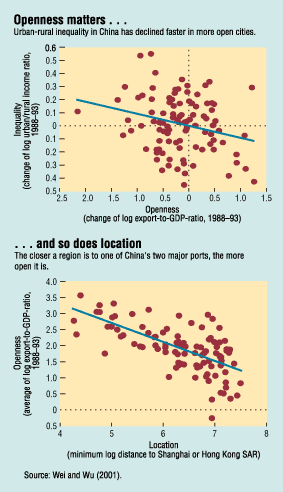Kiely defined that globalization refers to a world in which
societies, cultures, politics and economies have, in some sense come closer
together. Globalization gives a huge influence to the world, especially to the
developing countries such as China.
In globalization,
China’s GDP grew fast and the companies are becoming bigger and stronger. These
evident indicated a continuous economic development in China. Is that means
globalization is totally good for China?
It’s true
that China enjoy lots of benefits in globalization. Firstly, as a developing
country, china embraces the benefits of trade and direct investment because of
globalization. Before 1987, china’s foreign trade was negligible. But after
china opening the door to the world, the ratio of trade to GDP has quadrupled—from
a mere 8.5 percent in 1978 to 36.5 percent in 1999. Moreover, due to
globalization, china’s opening up was undertaken step by step. At the begining,
it started geographically with special economic zones, then advancing gradually
in various industries from the more competitive manufacturing industry to the
weak agriculture and service sectors.
So we can
see, under globalization, china seize the chance and realized that it is
crucial to develop itself but not protect for a developing country. And china
increases its advantages to absorb foreign capital and maximize the benefits of
opening up. That’s why China gain a lot in globalization.
However, in
my opinion which from my experience, while the Chinese economy has dramatically
increased its openness over the past two decades, income inequality has risen
as well, which cause a big suffering with the poor. For example,the World Bank
estimates that China's Gini coefficient—a measure of the inequality of income
distribution in a society (0 being perfect equality and 100 being complete
inequality)—rose from 28.8 in 1981 to 38.8 in 1995. These data indicate
an increase in inequality among residents. Moreover, I find some figures about
the inequality of 100 urban areas, since this kind of inequality constitute 75%
change in the general change of inequality in China from 1980 to 1990. We can
find a clear evidences from the data that cities which have opened up quickly
also had a quick decline in urban-rural inequality.
In addition,
referring to the income distribution, from 1988 to 1995, the poor who live
below the normal standard in terms of the purchasing power complained the
decline of income in most rural areas. Moreover, along with the opening in
rural area, an obvious reduction in poverty we can see.
Therefore,
we can see that globalization brings both advantages and disadvantages to countries.
What we can do is utilize the opportunities we can seize to make the country stronger.
At the same time, we also should admit the demerits that brought by
globalization, and try to improve them step by step.


Clear academic knowledge evident throughout your blogs supported by detailed independent research which is important at university level. This is especially evident in the above blog where you make constructive judgemental comments based on the facts and data researched
ReplyDeleteTOTAL MARKS FOR LAST 3 BLOGS 71%
Mark for first blogs 69%
Total blog mark 70%
You have achieved 28% of your overall module mark so far